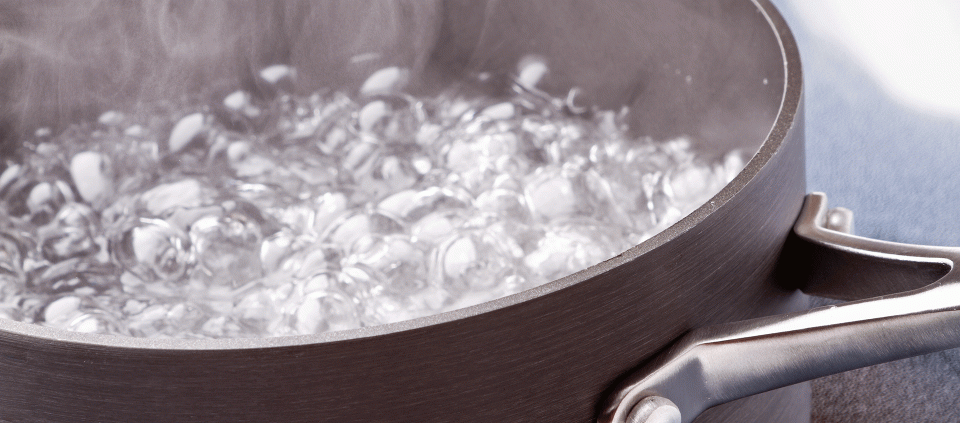The Ayurvedic Art of Cooking Water

In 2010, when I was a student in the Kripalu School of Ayurveda, Ayurvedic physician Anusha Sehgal introduced me to the practice of cooked water (“ushna udaka”). Cooking water is almost as easy as boiling water—but it’s a bit more nuanced.
Why do we cook water for any reason other than to make tea or coffee? Ayurveda, India’s traditional system of medicine, teaches that five elements were made in the creation of the universe. They are ether (space), air (wind), fire, water, and earth. According to Ayurvedic philosophy, air governs all movement; earth is stable and steady; water is cool, heavy, and cohesive in nature; and fire is the expression of heat and acts as a bridge between water, earth, wind, and space. Fire is the transformational element, changing ice to water, water to vapor, raw food to cooked food, wood to ash, experience to memory, and physical embodiment to ethereal manifestation.
The Charaka Samhita, the classical text of Ayurveda, states that boiled water is “appetizing” and tends to disintegrate the accumulation of kapha (watery, earthy, and damp qualities) while creating balance for pitta (fiery) types and vata (spacy/windy/cold) types. As water’s qualities are cool and heavy, it creates more internal heaviness and coolness. For some people, drinking water can increase a feeling of heaviness in the stomach, or create a feeling of having gained weight. For all of us, cold water will put out the digestive fire (agni) and thus is not recommended right before eating.
However, when you cook water, its inherent qualities are transformed, making it lighter, more warming, and easier to assimilate.
A Seasonal Approach to Cooked Water
Cooking your water doesn’t mean you have to drink it hot. You can let it cool and drink it at any temperature.
In the summer, digestive strength dials way down to keep the body from overheating. So you can cook a big pot of water first thing in the morning, let it cool, and drink it at room temperature throughout the day. The cooking will still make the water easier to digest even when it’s cooled down.
In late fall, winter, and spring, you’ll want to drink the cooked water before it cools down to room temp, to warm the body from the inside out.
How to Cook Water
I know, it seems silly to give you instructions for cooking water, but there are some details to be aware of:
The Pot
I have become a dedicated water cooker, so I bought a pot just for my water. You don’t have to do that, but I figured that, if I was going to keep this pot of water on my stove all day, I wanted it to be sacred and beautiful. I recommend using enamel-coated stainless steel, enamel-coated cast iron, or plain stainless steel. Don’t use nonstick cookware, as researchers question the safety of the chemicals used in the coating.
The Water
To filter or not to filter, that is the question. If you are boiling the water, you will be cooking out all the impurities. But if you are a chronic filterer and that makes you feel more relaxed, then go for it. Either is fine.
Cooking Instructions
- Cook your water in the morning. According to Ayurveda, leaving water overnight in a dark vessel will change its properties and decrease its vitality.
- Add enough water to a pot so you can continue to boil it throughout the day.
- Keep the pot uncovered.
- Turn heat to high and bring to a boil.
- Boil for at least 10 minutes.
Variations
- If you are a hot type (meaning that you wear layers in the winter so you can peel them off when you get overheated), bring the water to a boil and take it immediately off the heat.
- If you are working with a kapha imbalance—such as excess weight, mucous, congestion, or a cold—cook your water down to about one quarter of the original amount before taking it off the heat.
- If you are a vata type and run cold, dry, and nervous, cook it down to half the original amount before taking it off the heat.
- If you are unsure which category you fit into, just boil your water for 10 minutes.
Tips for Ease and Consistency
I fire up my water pot first thing, then go about my morning while the water is cooking. Do yoga, meditate, practice self-massage, take a shower, or whatever you usually do in the morning.
Once the water is cooked to your approval, take it off the heat. If you’re heading out for the day, transfer the water to glass jars or an insulated thermos to bring with you. If you’ll be at home, you can cover the pot and pour off a glass whenever you’re thirsty.
To your health!
Find out about upcoming programs with Erin Casperson, Dean of the Kripalu School of Ayurveda.
© Kripalu Center for Yoga & Health. All rights reserved. To request permission to reprint, please e-mail editor@kripalu.org.
Erin Casperson, Lead Kripalu Faculty and Director of the Kripalu School of Ayurveda, is passionate about sharing how the ancient practices of Ayurveda can be applied to modern-day living.
Full Bio and Programs